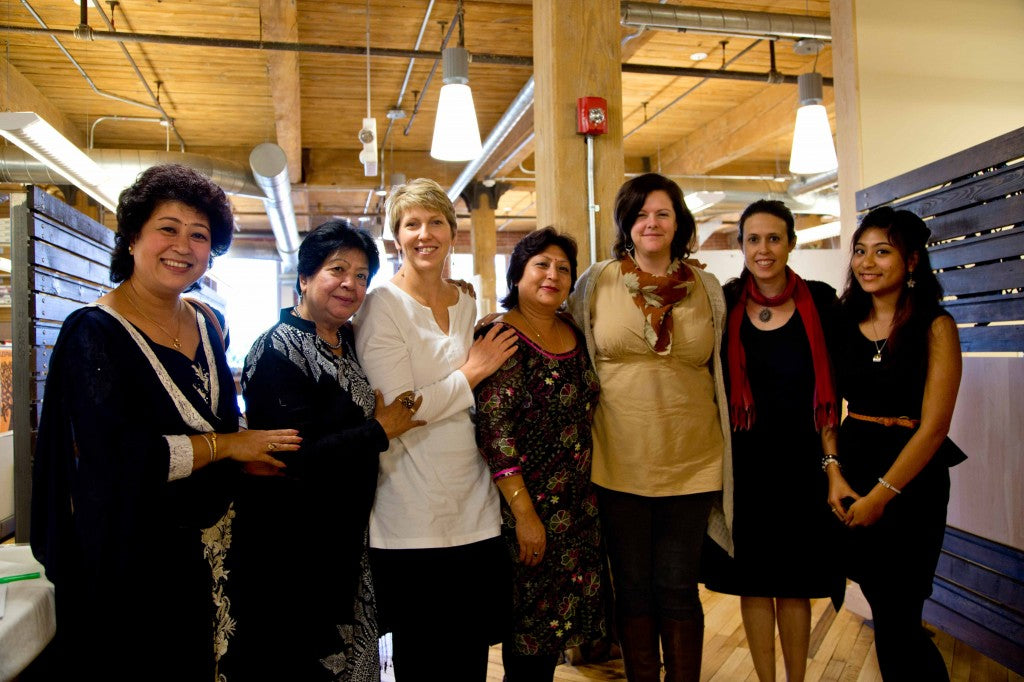
Celebrating Fair Trade Month with Manushi, “The Energetic Woman”
Fair Trade Month
Ten Thousand Villages wouldn’t be what it is today if not for the partnerships we’ve established with the skilled artisans around the world. We think about fair trade every day. But because October is fair trade month, we are spending a little extra time to showcase our artisans and spread the word about the good that fair trade does for people everywhere.
The energy of women is the driving force behind the group as the main objective is to empower the ‘grass root’ women of rural Nepal.
Artisan Visits
Because the hands behind our products are at the forefront of our mission, we interact and communicate with artisans as often as we can. This month, we met three women leaders of the artisan group Manushi (based in Kathmandu, Nepal) along with one of their daughters who was taking photos of the trip for the group.
Padmasana Shakya, Chairperson and Director
Nabina Shakya, Marketing
Anu Dhakwa Shakya, Designer
Shreeya Shakya, Daughter of Nabina
Humble Beginnings
These women clearly are so proud of all that they’ve accomplished when it comes to providing opportunities for the marginalized women of rural Nepal. Padma founded the organization from nothing in 1991, and Anu designed products based on the traditional craftwork of their grandmothers, but modernizing them and finding new ways of interpreting design while keeping precious techniques alive.
Nabina joined Manushi in 1993, after having earned her Master’s degree in Marketing. She realized that handicrafts were not selling well in local markets and that they needed to find a new audience who would appreciate these products. That’s when the group teamed up with Fair Trade Group Nepal who helped them connect with buyers around the world, including Ten Thousand Villages.
The Spirit of Manushi
The name Manushi translates to “energetic woman.” Padma explained that the energy of women is the driving force behind the group as the main objective is to empower the “grass root” women of rural Nepal, many of whom are illiterate and have very few opportunities to improve their lives.
 In Nepal, if a woman does not have money, she is not respected in her household or in her community. By training women with a practical skill such as jewelry making or textile work, the artisan becomes empowered both economically and socially. This skill improves her confidence as an individual, as a human being, and as a woman.
In Nepal, if a woman does not have money, she is not respected in her household or in her community. By training women with a practical skill such as jewelry making or textile work, the artisan becomes empowered both economically and socially. This skill improves her confidence as an individual, as a human being, and as a woman.
Empowering Women
 Padma notices the transformation in the women she trains. Very slowly, they begin to dress better, demonstrating their newfound confidence through their appearance. And as their sense of efficacy grows, they become more comfortable discussing what is wrong and right about their living situations and or issues in their workplace.
Padma notices the transformation in the women she trains. Very slowly, they begin to dress better, demonstrating their newfound confidence through their appearance. And as their sense of efficacy grows, they become more comfortable discussing what is wrong and right about their living situations and or issues in their workplace.
Padma encourages women to tell their stories and to bring attention to matters that are in need of improvement. Teaching women about their rights is just as important (if not more so) as the skills training Manushi provides.
Padma tells a touching story about women whose only way to earn money was to “break stones” — meaning that they chiseled stones to make gravel to be sold for use in roads and construction. “The stone hand cannot hold a needle,” she says, explaining how difficult it is at first for women with no textile experience to learn this new skill.
With a little perseverance, though, their hands become capable and they are able to earn a sustainable livelihood by exporting their textile work to fair trade retailers around Europe and to Ten Thousand Villages stores in the U.S. and Canada.
Happy October, happy fair trade month.
Celebrate Fair Trade Month — explore an artisan story and spread the word. Learn more at: www.fairtradefederation.org


Leave a comment